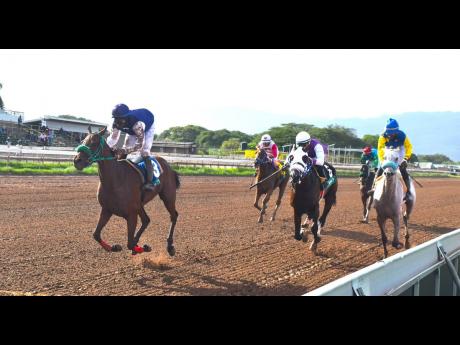Chaos reigns
Horse racing weekend in jeopardy after stakeholders’ furore
WEEKEND RACING at Caymanas Park, certainly Saturday, was scrapped yesterday morning after a ‘stakeholder discussion’ meeting called by promoting company Supreme Ventures Racing and Entertainment Limited (SVREL) descended into chaos.
Trainers and members of a team that last year negotiated a purse-allocation formula with the promoting company forced a premature end to the meeting, declaring that they would withhold nominations of horses until SVREL apply the agreement to $6.2 billion in sales, a figure the racetrack’s operator has rebuffed, saying it was erroneous reporting on its part, a matter which the Betting, Gaming and Lotteries Commission (BGLC) has been trying to resolve.
When presented with the $6.2 billion it had initially reported to the BGLC, SVREL subsequently informed the regulatory body that the true figure for local-racing sales, on which the agreement was struck, was actually $5.32 billion, the difference being betting conducted on racing at Caymanas Park at overseas tracks and online platforms from which the promoting company only earns a commission of three per cent, though the betting is reflected in the local tote.
However, anxious owners and trainers have refused to accept SVREL’s explanation, saying the purse increase was due January 2023, adding that costs to keep horses in training have soared while they await a resolution between the BGLC and SVREL with no end in sight after six months.
Solomon Sharpe, chairman, SVREL, said the meeting was called to defuse “rumours and innuendos” as it relates to the figures being clarified by the BGLC.
“There have been a lot of rumours and innuendos floating around the track so we called this meeting to bring clarity. The BGLC had a presence there. We explained the $5.32 billion and the difference caused by inter-tote wagering, which was never a part of the arrangement, being reported among local-racing sales,” explained Sharpe.
“Last year, we negotiated a historic agreement that stated purses would be tied to gross-gaming revenue, 49 per cent, which we budgeted and subsequently informed the horsemen,” he added.
Executive director of the BGLC, Vitus Evans, spoke at the meeting, confirming the agency was still in the process of verifying what he termed “a creditable explanation” by SVREL.
“The issue, as I understand it, is there are two figures at play. The trainers and Thoroughbred Owners and Breeders Association (TOBA) have $6.2 billion which SVREL had first reported, then the subsequent $5.32 billion,” Evans stated.
“SVREL gave us a creditable explanation, saying simulcast sales were inadvertently included, money on which they only get three per cent commission from that agreement. We have asked them for evidence because it would mean they would have paid us too much taxes,” Evans pointed out.
“We haven’t had sufficient information to feel confident it included simulcast racing. What we have actually asked SVREL to do is give us daily tally of sales on simulcast. They have submitted some information so far but we are not totally satisfied. We met with them today and should get full information before the end of this week,” assured the BGLC’s executive director.
Meanwhile, Howard Hamilton, TOBA’s president, said he has no desire to lock down horse racing but was forced to support the move due to “massive increases in costs of preparing horses” for SVREL’s promotion of races, stating $2.19 billion per year as owners’ expenses.
Recognising that revenues generated by the promoting company “cannot make a reasonable contribution (sustainable purse money)”, Hamilton suggested that SVREL should lobby the Government for “a special tax on lotteries to supplement these costs”.
“The undeniable fact is that we cannot afford to keep horses in training with the costs that keep escalating. Every jurisdiction gets assistance, in one form or the other, to supplement these costs,” he added.

